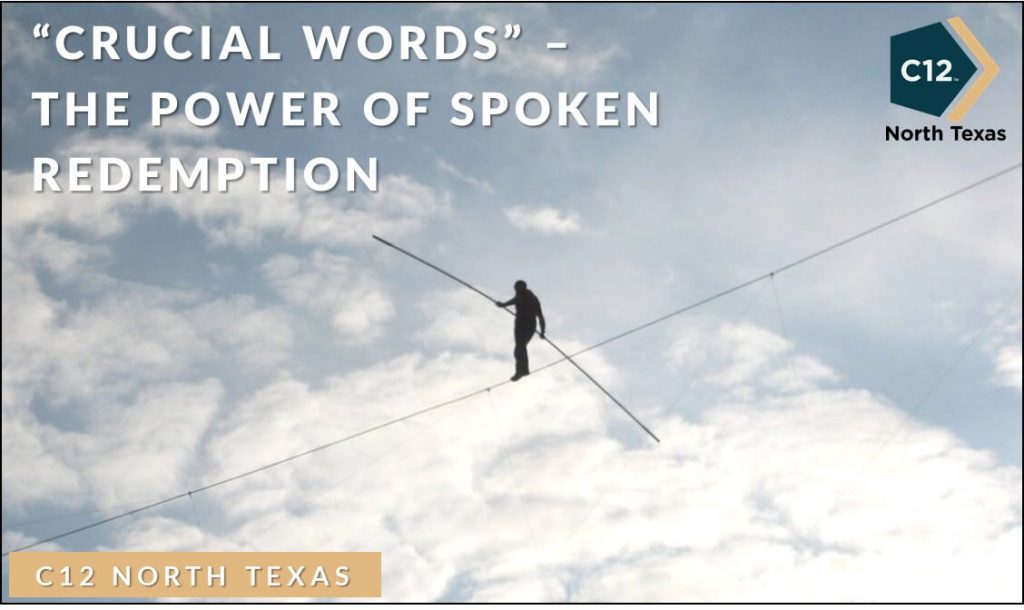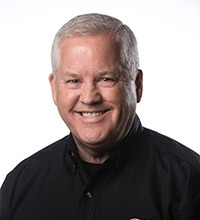Our Promise to
Every Member
We promise to be an example of all we promote, to be accountable to our members and to seek their correction when any deviations appear. We serve as a resource for education, encouragement, challenge, inspiration and accountability.
“Crucial Words” – The Power of Spoken Redemption

The great Wallenda family makes their living by crossing between two structures on a slender wire. Maybe they are crossing over Niagara Falls or between two skyscrapers in New York City. Recently, the amazing feat was passing over a live volcano filled with bubbling lava. In any of these cases, if they lose their balance to the left or the right, the consequences are obviously dire.
Most of us will not tempt lava pits. More common is that we will encounter pivotal moments when the crucial words spoken by someone will move us toward a better future, or, alternatively, will send us a journey of discouragement and despair. Either way, we are marked by the experience.
When I was growing up my father would take me to a country road and let me drive the car. My dad taught me good driving skills and he also let me learn at my own pace. At twelve years old, this was an empowering thrill for me. Learning to manage a stick shift and feeling a sense of control over a powerful machine, what gets better than that? I felt “grown-up”. Dad was helping me become independent and showing that he trusted me. And I wanted to always prove that he made the right decision to let me drive. There are few things as powerful to a son as his father’s respect.
Fast forward to the summer that I turned 17. Our family had returned from four years in Europe where my Air Force father had been stationed. We were in the process of moving to Wyoming and had a four-day road trip to get there from Georgia. By now, I had a driver’s license and a great deal more driving experience. I had made many trips with my grandfather taking watermelons and cantaloupes to the farmer’s market. Local trips were no big deal for me, either. But this was different. Would I be trusted on the highway with the family in the car?
The answer came on the third day of the trip. We were somewhere in Kansas where the roads were straight and flat. My father asked me if I wanted to drive. Of course, I wanted to drive. My mother and brother did not object, so with Dad beside me I took the wheel and headed west. It was a four-lane divided highway that was very busy. I was very conscious of my responsibility and drove cautiously. Everyone seemed relaxed and happy with me.
It came time for a gas and snack stop. I had to cross the median and the east-bound traffic to get to the station. After the fill-up and break, we piled back in the car to get started again. I pulled to the edge of the road and aimed for the median. By now, the traffic had become very heavy in both directions. My head swiveled to the left, then to the right trying to find the right timing to cross over to the westbound lanes. The longer I waited, the more anxious I became. I felt the tension in the car, too. (Passengers notice when the driver is nervous.) Finally, almost in desperation, I spotted a small opening and gunned the car forward. The good news is that we made it to the median. The bad news was that I barely avoided an oncoming truck. My mother and brother immediately reacted to the near-miss by shouting in unison at me. Who could blame them since I had frightened them so?
Time slowed down for me as I processed the deserved criticism. I knew they were right. It was my mistake. I also knew that my father had not yet responded. In less than a second, I imagined what his responses might be. Anger would be completely justified. Disappointment in my judgment, of course. A good lecture sternly delivered would make sense. There was no doubt that I would be immediately removed from driving (probably for a few years).
However, the first thing he did was to turn quickly to the backseat, held up his hand, and firmly told them to “stop”. They quietened. Then, with my fate in the balance, he turned to me and said two words I will never forget.
“Drive on.”
More than forty years later I am still amazed at the power of his response. Two different words (e.g., “get out”) easily could have scarred me by reminding me of my mistake and shortcomings. Instead, with a simple affirmation and inexplicable confidence, he restored me.
Failure in life comes to everyone. We see it in ourselves and in those closest to us. When it is us and our self-awareness is most acute, we are perched on a precipice and our fate is determined by what is said next. The words can lead to restoration or to a reinforcement of our inadequacy.
Jesus modeled this for us in the story of Peter, his hot-headed disciple. Peter, never lacking in confidence, assured Jesus that although others might betray Him, he would certainly not do so. The New Testament records his embarrassing betrayals that occurred only a few hours later. In the most crucial time of Jesus’ earthy life, Peter failed (and he failed publicly). Surely this would disqualify him for any subsequent leadership role. It should have marked him for the rest of his life as someone that was untrustworthy and undeserving of high position.
Yet Jesus saw things differently.
Rather than marking Peter as an abject failure, he spoke crucial words to him in the form of the question, “Do you love me?”. When repeated three times, he neatly offset the three statements of betrayal made by Peter. He reoriented Peter away from his failure and toward the fundamental truth that always was true (“Jesus loves me, this I know.”). And, Jesus simultaneously equipped Peter for the great mission that was ahead for him. What power!
Sometimes we all need to hear such crucial words spoken at an incredibly vulnerable moment. Sometimes we need to speak these words to someone else knowing that the right crucial words are redemptive. At C12, we don’t gloss over mistakes nor do we fixate on them. The mission is too important to allow a failure to derail us or our fellow members. Instead, we seek to say what needs to be said to move forward. Press on.
Not that I have already obtained this or am already perfect, but I press on to make it my own, because Christ Jesus has made me his own. Brothers, I do not consider that I have made it my own. But one thing I do: forgetting what lies behind and straining forward to what lies ahead, I press on toward the goal for the prize of the upward call of God in Christ Jesus. Philippians 3:12–14

Tom Hawes is the Principal Chair for C12 North Texas. Since 2011, Tom has had the pleasure of facilitating forums in North Texas. Contact him at [email protected] or 214-620-9366.
Recent Blog
Archives
2020
-
September (1)
-
August (3)
-
July (1)
-
March (4)

